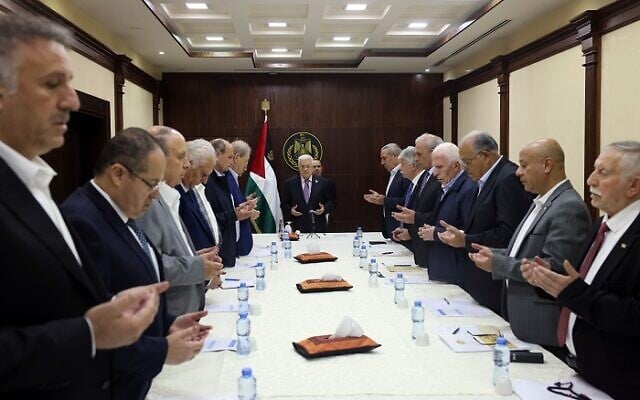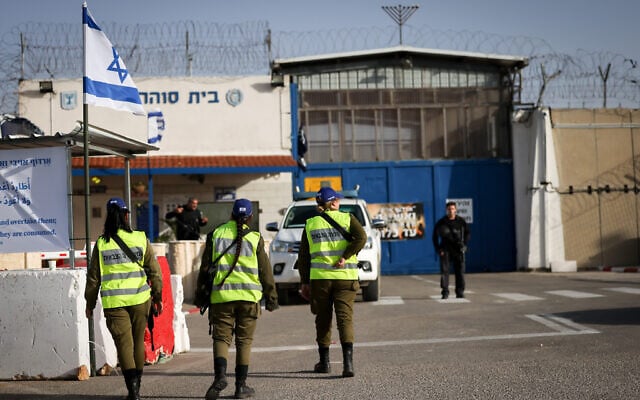



US President Donald Trump’s administration welcomes the decree signed by Palestinian Authority President Mahmoud Abbas to end Ramallah’s prisoner payment program, a State Department spokesperson told The Times of Israel on Wednesday.
The statement represented the first response from Washington to the PA announcement after two days of silence.
It also appeared to amount to a notable break with Israel, which had quickly dismissed the reform.
“This appears to be a positive step and a big win for the administration,” the State Department spokesperson said. “We welcome any and all steps to end this abhorrent practice.”
“We will monitor how the law is implemented over the coming weeks and months and will verify that the practice has ended,” the statement to The Times of Israel continued. “We look forward to consulting with the Palestinian Authority and the Israeli government on this development.”
The decree signed by Abbas canceled legislation that conditioned welfare payments to Palestinian security prisoners on the length of their sentences in Israeli jails, in addition to providing stipends to the families of terrorists killed while carrying out attacks.
The decree states that families of prisoners and slain attackers who require welfare assistance will be eligible for stipends based solely on their financial needs, as is the case with other Palestinians.
Successive US administrations sought to coax the PA into reforming the policy but were met with pushback from Ramallah, which lionizes the thousands of Palestinians currently in Israeli jails, arguing that many of them are there unjustly.
The Biden administration managed to make significant progress on the effort, and the reform was largely finalized late last year. However, Ramallah chose to hold off on announcing the initiative until after Trump’s election as a gesture of goodwill to the new administration.
The European Union’s Mideast envoy Sven Koopmans voiced similarly cautious optimism to that heard from the Trump administration.
“The EU has long and vocally argued for fundamental reform by the Palestinian Authority of the ‘prisoner payment’ system. The publication of such reform, while we must study the details, is very welcome news at a very difficult time,” Koopmans tweeted.
The response in Jerusalem was far less excited, with the Foreign Ministry on Monday calling the decree “a new fraudulent exercise by the PA, which intends to continue making payments to terrorists and their families through other channels.”
Israeli law requires the government to conduct a review of the PA’s prisoner payment system at the beginning of every calendar year, so Jerusalem could theoretically wait until early 2026 before deciding whether Ramallah complies with Knesset legislation targeting the PA over its controversial stipends.
The Trump administration may also have different criteria for adjudicating the PA reform, even though it was authorized by career legal bureaucrats under the previous administration.
Biden officials also briefed congressional lawmakers about the reform last year and received support from both sides of the aisle, including Republican Lindsey Graham, the second source said.
Ramallah presented the reform to the US near the beginning of the previous administration, seeking to bring the PA into compliance with the Taylor Force Act — 2018 congressional legislation that suspended US aid to the PA as long as it continued granting the stipends.
According to the text of the decree, the program to allocate welfare funds will be transferred from the Social Development Ministry to a new fund called the Palestinian National Foundation for Economic Empowerment.
A strict criteria system has been put in place to determine eligibility that will be reviewed twice a year, a source familiar told The Times of Israel on Monday.
Many families of prisoners and slain attackers who were receiving government stipends will continue to receive financial aid, given the high poverty rate in the West Bank. This has only gone up further since October 7, with Israel ending its permit system to over 100,000 Palestinians working in Israel and the settlements — a key component of the West Bank’s economy.
The practice of paying allowances to those convicted of carrying out terror attacks and to the families of those killed while carrying out attacks has been pilloried by critics as incentivizing terror and held up by Israel as a symbol of PA corruption and its inability to serve as a partner for peace.
Palestinian leaders have long defended the payments, describing them as a form of social welfare and necessary compensation for victims of what they said is Israel’s callous military justice system in the West Bank.
Abbas signed the decree as the US Supreme Court prepares to adjudicate a case in the coming months on whether American victims can sue the PA and its international arm, the Palestine Liberation Organization, for damages due to Ramallah’s payments program.
While the Biden administration believed that the reform would bring the PA into compliance with the Taylor Force Act, the US would still be barred from directly funding the PA due to separate US legislation preventing such aid once Ramallah began advancing investigations against Israel at the International Criminal Court.
However, the reform would still theoretically be sufficient enough to enable the US to fund projects that directly benefit the PA.
Times of Israel staff contributed to this report.



